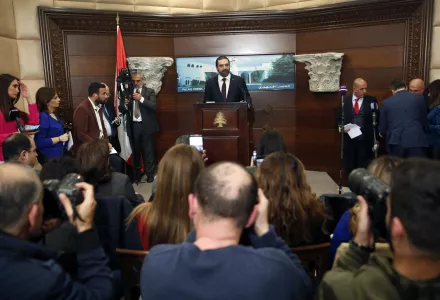
After a nine-month deadlock marked by political bickering, a struggling economy and massive growing public debt, Lebanon’s political elite finally agreed Thursday on the formation of a new government. The compromise among Lebanon’s sectarian political factions will certainly inject some much-needed social normalcy and stability, and the new government will historically include four women ministers, among them Raya al-Hassan, leading the influential Ministry of Interior.
However, a closer look at the challenges this new government will have to tackle shows a more complicated picture. Here are three reasons for limited optimism.
Weak implementation of needed reforms
For the new government headed by the former and now incumbent prime minister, Saad Hariri, the most immediate challenge will be the economy. Lebanon’s public debt is steadily growing, and the new government will be expected to deliver on a set of pledges to unlock billions of dollars in promised foreign aid and loans to boost the country’s low and slow growth. However, the implementation of much-needed reforms faces two important obstacles.
The first is that ministers in the new government represent the same political factions guilty of exploiting public funds to strengthen their bases and maintain their electorates. It is unlikely that the same political representatives will suddenly decide to change old habits and implement reforms designed to prevent corruption and embezzlement.
The second issue will be revamping how the country’s political elite view the role of the public sector and the tax system. The World Bank and the International Monetary Fund agree that one way to create jobs and support the sluggish economy would be to reform the public sector, curb expenditures and improve the tax system. However, political factions in previous governments successfully derailed any reforms that called for progressive taxes on the wealthiest members of society.
Moderating U.S. sanctions
In October 2018 following an event commemorating the 35th anniversary of the 1983 Marine barracks bombing in Beirut, President Trump signed into law the Hezbollah International Financing Prevention Amendments Act (HIFPAA). Conceived as part of the Trump administration’s plans to impose sanctions on Iran and its allies in the Middle East, the HIFPAA is meant to “isolate Hezbollah from the international financial system and reduce its funding.”
For the last few months, U.S. officials have signaled their concern to the Lebanese government over the possibility that Hezbollah’s share in the new government would include the Health Ministry. And the Trump’s administration’s “red line” warningspromised additional sanctions and other punitive measures to ensure that Hezbollah was denied the capabilities to use the Health Ministry’s resources to shore up its bases and strengthen its political influence in Lebanon and beyond the Shiite community.
In a statement Thursday, a U.S. Treasury Department official gave Lebanese officials mixed signals regarding how the Trump administration will interpret Hezbollah’s role in the new government. Despite some assurances that the United States will continue providing assistance, the new government will need to a find a way to accommodate U.S. interests and mitigate the possibility of new sanctions against Hezbollah’s financial networks and, by extension, Lebanon’s banking sector. While the Health Ministry was allocated to Hezbollah, the new minister is allied with the party but not actually a member.
Although U.S. officials have vowed to monitor Hezbollah’s activities and performance in the new government, it seems that, for now, the new government, in agreement with Hezbollah, has avoided a new round of sanctions. Nevertheless, the Lebanese government will still need to actively mitigate the pressures of existing sanctions against Hezbollah, especially those that target the banking sector and the country’s overall financial system.
Stalling the push for a new political system
After long months without a government, the moment of relief following the announcement of the new government may prompt some Lebanese citizens to pause their calls for serious political reform. The glimpse of hope that materialized with civil society’s empowered rolein the 2016 municipal elections and 2018 parliamentary elections has now been eclipsed by the fixation on pulling Lebanon from the brink of economic collapse. As a result, even the fiercest critics of the current archaic sectarian political system may opt to silence their revolutionary calls in favor of saving Lebanon from total economic, social and political disintegration.
Political factions in the new government may be aware of the severity of the looming economic crisis and the need to implement dire reforms. However, a closer look at previous compromises among the political elite strongly suggests that they are temporary bargains in a permanent state of paralysis. The unintended consequence of the looming economic crisis in Lebanon has compelled most of population to warmly welcome the new government and coalesce around the same political leaders who are the architects of past and ongoing political debacles. Once the dust settles, we will see if the new government proves able to alter Lebanon’s dangerous cycle of perpetual paralysis and pave the way for a new social contract.
Jeffrey G. Karam is an assistant professor of political science at the Lebanese American University. He is also an associate at the Harvard Kennedy School of Government’s Middle East Initiative. You can follow him on Twitter @JGKaram.
Karam, Jeffrey G. “Lebanon Finally Has a New Government. Here are Three Reasons for Cautious Optimism..” The Washington Post, January 31, 2019




